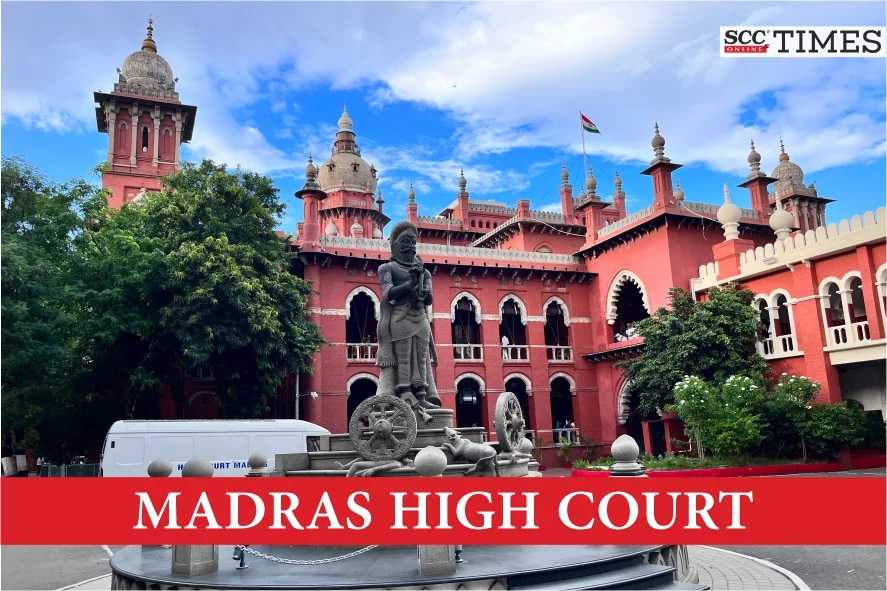Madras High Court: In batch of criminal appeals filed by former AIADMK Minister Balakrishna Reddy and other Ministers against the conviction order passed by the Special Court for cases related to elected members of Parliament and Members of Legislative Assembly of Tamil Nadu, Chennai, and set aside the same and consequently acquit them, G. Jayachandran, J. has set aside the impugned judgment and has acquitted all the convicts of their charges, as the charges were not proved beyond doubt.
Background:
On 30-09-1998 about 150 persons assembled to protest which resulted in registering of a false case against Minister M. Govinda Reddy. It was alleged that the said Minister along with his followers gathered near Bus Stand unlawfully to protest against police. Some of them were carrying weapons with a common object to use force and violence. Pursuant to the common object, they restrained vehicular movement and caused traffic disturbance. When the Inspector of Police requested the crowd to disburse, they refused and started raising slogans. They pelted stones at the Police Officials as well as the vehicles passing through. During the said action, three policemen were sustained grievous injury and few more sustained simple injuries. The jeep of the police department was set at fire and a two-wheeler owned by a private person and three public transport buses were damaged.
The Trial Court had spilt up the case against six accused, who were absconding during pendency of the trial and issued NBW against them. Pending trial, 21 of them died. Against the remaining accused, the Trial Court has held them guilty of respective charges and imposed sentence. In its judgment, the Trial Court had retained the names of the accused who were dead. Therefore, though the charges were framed against 100 accused, in the judgment, the names of 108 accused were there.
Challenging the judgment, the convicted persons had pointed out certain inherent defects in the prosecution case, which accordingly renders the judgment of the Trial Court bad and liable to be set aside.
Analysis and Decision:
The Court noted that there is grave doubt whether the jeep was set on fire by the mob as alleged by the prosecution, as the identity of the jeep is highly doubtful. The ownership of the vehicle is also not proved by the record. Further, it said that the exaggeration in the prosecution case could be easily seen from the non-production of the above said material evidence for appreciation and also failure to produce the alleged materials like, empty plastic pots, lorry tubes, stones, iron rods etc. which have been mentioned in the First Information Report and in the statements of the witnesses.
The Court said that the incriminating evidence against the convicts is only the oral evidence of injured witnesses, who are police personnels and they have interest in the outcome of the prosecution case. Their testimony regarding the injuries has not been corroborated by reliable medical evidence. The failure to examine the Doctor, who had treated them is fatal to the case of the prosecution, since the wound certificates does not reflect the true nature of the injury sustained. Further, the Doctor who has given wound certificates, had not produced any evidence like X-ray, or treatment particulars to cover injuries of the policemen under the definition of grievous hurt. Even to take it as simple hurt, the prosecution evidence is short of proof.
The Court said that this is the case where the members of the political party gathered in public to protest the inaction of the police in controlling the illicit arrack. This was a spontaneous reaction, when 50 persons died consuming illicit arrack. Since the protest was against the police for their inaction, the peaceful protest turned into a riot, after the arrival of a witness who had gone to the spot at the instance of DSP.
The Court said that the failure to produce the logbook of the vehicle and the contradiction between the witnesses regarding the place where they parked the vehicle also renders the prosecution case highly unbelievable.
The Court said that since the prosecution fails to recover any other material object to prove that some of the members of the assembly were armed with weapons, the charge under Section 148 of IPC also cannot be held proved. Moreover, the Accident Register maintained in the hospital at the time of admitting the patient is not produced by the prosecution. There is serious doubt about the time of their admission, nature of treatment and nature of wound.
Thus, after a cumulative assessment of the evidence, the Court found several lacunae in the prosecution case and those lacuna gives benefit of doubt to the convicts. The Trial Court unfortunately had failed to note that the prosecution is unable to even ascertain the identity of the persons gathered for protest and formed unlawful assembly, convicted them at random based on the weak evidence and uncorroborated evidence. Therefore, the Bench set aside the impugned judgment and has acquitted all the convicts of their charges, as the charges were not proved beyond doubt.
[Balakrishna Reddy v. State of Tamil Nadu, 2024 SCC OnLine Mad 2715, decided on 03-07-2024]
Advocates who appeared in this case :
For Appellant: Senior Counsel B.Kumar
For Respondent: Government Advocate K.M.D.Muhilan







